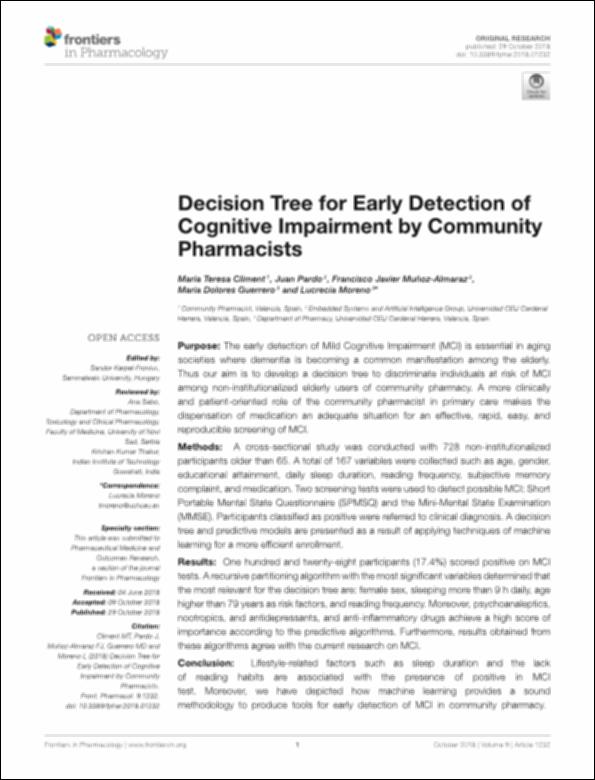Por favor, use este identificador para citar o enlazar este ítem:
http://hdl.handle.net/10637/10228Decision tree for early detection of cognitive impairment by community pharmacists
| Título : | Decision tree for early detection of cognitive impairment by community pharmacists |
| Autor : | Climent Catalá, María Teresa Pardo Albiach, Juan Muñoz Almaraz, Francisco Javier Guerrero, María Dolores Moreno Royo, Lucrecia |
| Materias: | Memoria - Trastornos.; Memory disorders - Diagnosis.; Pharmaceutical services.; Drugstores.; Memory disorders.; Atención farmacéutica.; Farmacias. |
| Editorial : | Frontiers Media. |
| Citación : | Climent, MT., Pardo, J., Muñoz Almaraz, FJ., Guerrero, MD. & Moreno, L. (2018). Decision tree for early detection of cognitive impairment by community pharmacists. Frontiers in Pharmacology, vol. 9 (octubre), art. 1232. DOI: https://doi.org/10.3389/fphar.2018.01232 |
| Resumen : | Purpose: The early detection of Mild Cognitive Impairment (MCI) is essential in aging societies where dementia is becoming a common manifestation among the elderly. Thus our aim is to develop a decision tree to discriminate individuals at risk of MCI among non-institutionalized elderly users of community pharmacy. A more clinically and patient-oriented role of the community pharmacist in primary care makes the dispensation of medication an adequate situation for an effective, rapid, easy, and reproducible screening of MCI. Methods: A cross-sectional study was conducted with 728 non-institutionalized participants older than 65. A total of 167 variables were collected such as age, gender, educational attainment, daily sleep duration, reading frequency, subjective memory complaint, and medication. Two screening tests were used to detect possible MCI: Short Portable Mental State Questionnaire (SPMSQ) and the Mini-Mental State Examination (MMSE). Participants classified as positive were referred to clinical diagnosis. A decision tree and predictive models are presented as a result of applying techniques of machine learning for a more efficient enrollment. Results: One hundred and twenty-eight participants (17.4%) scored positive on MCI tests. A recursive partitioning algorithmwith themost significant variables determined that the most relevant for the decision tree are: female sex, sleeping more than 9 h daily, age higher than 79 years as risk factors, and reading frequency. Moreover, psychoanaleptics, nootropics, and antidepressants, and anti-inflammatory drugs achieve a high score of importance according to the predictive algorithms. Furthermore, results obtained from these algorithms agree with the current research on MCI. Conclusion: Lifestyle-related factors such as sleep duration and the lack of reading habits are associated with the presence of positive in MCI test. Moreover, we have depicted how machine learning provides a sound methodology to produce tools for early detection of MCI in community pharmacy. Impact of findings on practice: The community of pharmacists provided with adequate tools could develop a crucial task in the early detection of MCI to redirect them immediately to the specialists in neurology or psychiatry. Pharmacists are one of the most accessible and regularly visited health care professionals and they can play a vital role in early detection of MCI. |
| Descripción : | Este artículo se encuentra disponible en la página web de la revista en la siguiente URL: https://www.frontiersin.org/articles/10.3389/fphar.2018.01232/full |
| URI : | http://hdl.handle.net/10637/10228 |
| Derechos: | http://creativecommons.org/licenses/by/4.0/deed.es |
| ISSN : | 1663-9812. |
| Fecha de publicación : | 1-oct-2018 |
| Centro : | Universidad Cardenal Herrera-CEU |
| Aparece en las colecciones: | Dpto. Farmacia |
Los ítems de DSpace están protegidos por copyright, con todos los derechos reservados, a menos que se indique lo contrario.


